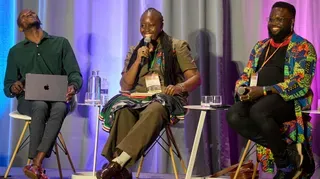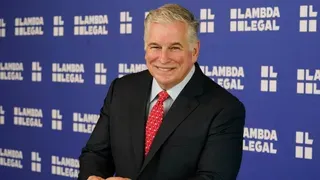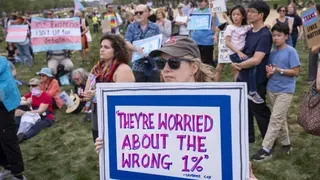July 26, 2011
New mental health center opens in the Castro
Kevin Mark Kline READ TIME: 5 MIN.
It's been an emotional year for providers of LGBT mental health services since the closure of New Leaf: Services for Our Community nine months ago, but it appears that summer might finally be lifting some of the gray clouds with the opening of Queer LifeSpace, a new low-income mental health services organization.
Located in the same building as the San Francisco Therapy Collective, a for-profit counseling collective, in the heart of the Castro, Queer LifeSpace began conducting intakes earlier this week in its deep wine and iris colored offices overlooking the Walgreens parking lot.
The organization is spearheaded by four former New Leaf mental health and substance abuse therapists who founded the SF Therapy Collective.
Friday, July 22 marks the beginning for Queer LifeSpace with the opening of its doors and an invitation-only party, said Nancy Heilner, executive director.
Queer LifeSpace is the newest organization to fill the gaping hole in mental health services left by New Leaf's closure last October. The UCSF AIDS Health Project and Lyon-Martin Health Services both picked up the shuttered agency's displaced low-income clients and integrated them into its counseling programs. Lyon-Martin, however, is experiencing its own fiscal problems and is not accepting new patients.
The SF Therapy Collective was launched by Heilner, Chris Holleran, Stacey Rodgers, and Joe Voors shortly after New Leaf closed its doors. The therapists, who are gay and lesbian and worked together as a team in the adult substance abuse program at New Leaf, originally attempted to lower their counseling fees to accommodate and continue to see their low-income clients. But the rates simply weren't low enough in spite of the collective's "generous sliding scale" and they couldn't feasibly lower the fees further, Heilner said.
Affordable queer therapy
The solution came recently when an opportunity allowed the collective to "fulfill our total vision of providing low-cost mental health services," Heilner said. All the pieces came together, including training future therapists.
"We all worked together at New Leaf and felt really passionate about providing services to our community," said Heilner, 55, who started as a volunteer at New Leaf in 2004, while working as the director of community-based programs of Edgewood Center for Children and Families. She was hired as manager of New Leaf's adult substance abuse program and the HIV mental health program four years later.
"We believe that people deserve good quality mental health [and] substance abuse services, even if they can't afford private therapy," added Heilner, aware of the importance of the organization centered in the heart of the Castro. "We are going to be a safe place that our community can come to and know that they will be understood."
Rodgers, who is director of communications of Queer LifeSpace, added that for some people, receiving treatment provided by individuals in their community and culture is "very healing" and "we want to be able to make sure that's available here."
Rodgers, who is in her 40s, was a counselor in the adult substance abuse program at New Leaf for five years.
Holleran, who is director of operations, handles intake for Queer LifeSpace. Heilner, Holleran, and Rodgers are considering seeing some clients on the nonprofit side of their venture, but Voors, who is director of finances, won't provide counseling services, Heilner said.
Currently, the new counseling organization is able to exist solely on client fees, thanks to $25,000 seed money provided by the SF Therapy Collective, said Heilner, and up to an estimated $20,000 of in-kind donations, added Rodgers.
The estimated budget for the 2011-12 fiscal year is $150,000. Heilner said the group expects the budget to more than double to $350,000 for 2012-13.
The therapists are not drawing a salary now. The executive director, and directors of operations, communications, and finance will each earn $35,000, Heilner said.
Individuals will be able to see a therapist for $20 per session and group therapy is $10, she said. Most of the counseling will be provided by six of the interns that will begin soon, said Heilner.
SF Therapy Collective will refer clients who can't afford its services to Queer LifeSpace, said Heilner. The two entities are separate.
The collective's goal is to provide long term support to clients who need the services, Heilner and Rodgers said, rather than shorter-term services, like Lyon-Martin currently provides, according to medical director Dr. Dawn Harbatkin.
Therapy, not a luxury item
"Therapy isn't a luxury item," said Rodgers, who pointed out that maintaining a healthy emotional life is a "foundational layer" that helps keep individuals from self-destructive behavior and enables them to lead healthy lives.
Heilner added that it's especially essential for LGBT individuals, who oftentimes experience trauma coming from very homophobic places or have anti-gay experiences as children or adults.
"Getting the therapeutic interventions that can help people kind of heal and recover from the experiences they've had in their lives really is essential to having a healthy thriving queer community," Heilner said.
Queer LifeSpace will provide individual, group, and couples counseling as well as integrated mental health and substance abuse services, according to Heilner and Rodgers. Collectively the therapists specialize in trans-affirming therapy, substance abuse issues, and trauma recovery.
Establishing a transgender support group is a priority, said Heilner. Other support groups will be client and intern driven, she added.
The organization is also reaching out to other mental health agencies and programs working with LGBT individuals in order to reduce duplication of efforts and to work in coalition, Heilner and Rodgers said in response to the Bay Area Reporter's questions about services for bisexuals, seniors, transgenders, and youth.
"We are definitely going to be open to the community telling us what it needs and be as responsive to that," said Heilner, emphasizing that the organization is in its infancy and is not able to "do everything at once."
Heilner and her colleagues don't expect client fees will sustain Queer LifeSpace. The organization's leadership is researching potential community and corporate foundation grants as well as individual donor support. Due to budget cuts, they aren't seeking city funding, Heilner and Rodgers said.
"We are really happy and proud of the work that we've done toward creating an organization that is compact and streamlined and being able to offer a lot of services without a huge overhead," said Rodgers.
AHP is still adjusting from its usual intake, which averaged up to eight new referrals weekly, but is now averaging up to potentially 15 new referrals weekly, said director Lori Thoemmes. The increased referrals came with only a slight increase in funding, Thoemmes said.
Michelanne Baker, who brought New Leaf's acclaimed training program to AHP as a temporary clinical psychologist, joined the staff permanently in April. She is now a co-coordinator of the clinical training program at the agency and aiding the process of merging AHP and New Leaf?s training programs into one, said Baker and Thoemmes.
Interns from Baker's program are already finding a new home at Queer LifeSpace, said Baker and Heilner. Providing training opportunities for newly minted LGBT therapists who came to San Francisco to get hands-on LGBT specific psychotherapy training was another goal of the collective, Heilner said, anticipating that Queer LifeSpace will house a comprehensive training program for LGBTQ therapists by September 2012.
Baker praised her former New Leaf colleagues who founded Queer LifeSpace and SF Therapy Collective, and welcomed the new nonprofit counseling organization.
"I'm very excited ... it's a nice addition to what's being offered," she said about the low-fee private pay services, which provided mental health services for uninsured and ineligible city health care patients, once a component of New Leaf?s services.
"I'm hopeful that it will provide a niche for people who don't have other places to go for LGBT affirming psychotherapy services," added Baker.
To schedule an appointment, call the intake line at (415) 358-2000, ext. 302. To receive an invitation to Queer LifeSpace's opening party, contact Stacy Rodgers at (415) 358-2000, ext. 321 or [email protected]. For more information, visit www.queerlifespace.com or www.sftherapycollective.org.







